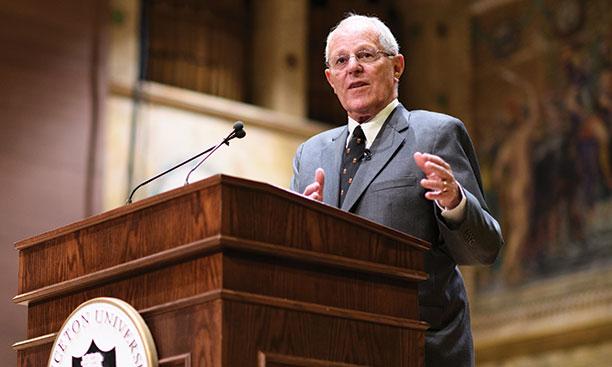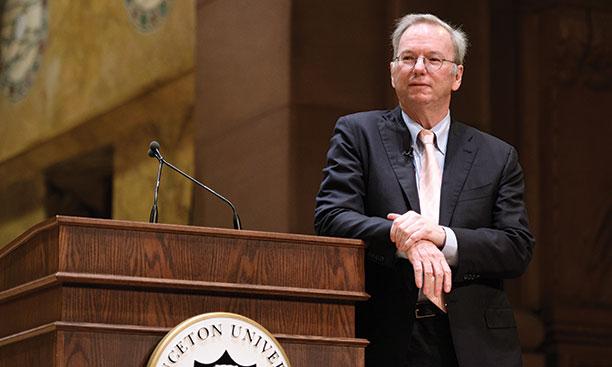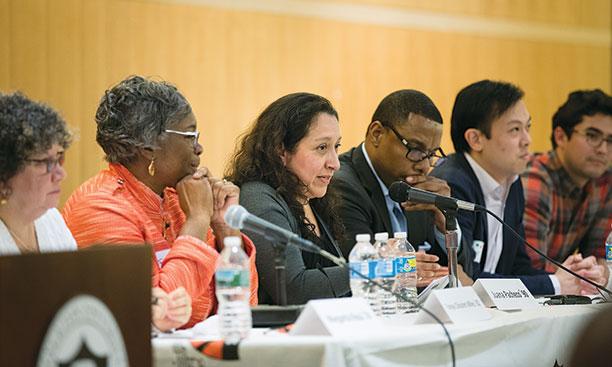
The 1,000 or so Princeton graduates and guests at Alumni Day last month got a taste of the experience they once enjoyed as Princeton students, including talks and panels on some of today’s most pressing issues — in this case, ranging from wealth distribution and cyberwarfare to immigration and the 2016 election.
The James Madison Medal winner, Peruvian President Pedro Pablo Kuczynski *61, began his address in Richardson Auditorium with an anecdote from a meeting he had with President Donald Trump the previous day. (The Madison Medal is the highest honor given to a graduate alum.)
“We started chatting and, you know, [Trump] is a real diplomat. He said, ‘How old are you?’” Kuczynski said to uproarious laughter. After the auditorium quieted, he added that Trump’s point was that he didn’t look a day over 60. (He is 78.)
Kuczynski moved on to unpack some of the deep social problems gripping Peru, many of which he says are endemic in Latin America writ large: political corruption, wealth inequality, an aging population, and a decline in the growth rate of world trade. The president said his administration’s No. 1 priority is clean water. Of Peru’s 32 million people, Kuczynski said, 10 million live without potable, running water in their homes.
“And of course if you don’t have potable, running water you don’t have a sewer,” he said, adding that with increased rainfall due to climate change, the risk of cholera and dengue has been significantly intensified. By the end of his term in 2021, the president hopes to have running, potable water in every urban home — an investment that he believes will cost about $50 billion.

The Woodrow Wilson Award winner was Eric Schmidt ’76, executive chairman of Google’s parent company, Alphabet Inc. An engineering major at Princeton, Schmidt used his address to tackle modern-day tribulations, too, through the lens of a scientist. He came to an optimistic conclusion.
“You see these attacks on globalization and science, but every time there’s been an attack on science, science has won. We forget that humanity comes with ambition and people come with dreams and hopes and cultures,” he said. “It’s that power, that underlying essence of humanity ... that allows us to get through these crises. The problems before us now are not as big as those that we’ve overcome in earlier times.”
Schmidt heralded the rapid proliferation of technology in recent decades, stating that we are on the verge of technological ubiquity: “There are 4.2 billion toothbrushes in the world; [in two or three years] there will be more smartphones than toothbrushes” — a life-altering improvement for those in developing countries for whom a smartphone represents a means of communication, information, safety, and political engagement, he said.
Addressing public concern about potential downsides of technology — such as automation displacing workers, a decline in human-to-human contact, and a spike in cyberwarfare, Schmidt said, “We’re beginning to know what the big questions are and what the answers are going to be.
“Who will need to answer these questions?” he asked rhetorically. “Princeton. Can you think of an organization better suited to address [that] multiplicity of issues?”
Some alumni passed up the keynote talks to learn about issues related to the U.S. election, heading to McCosh 10 to hear a panel on immigration and refugees (the three professors on the panel thought White House immigration policies were misguided) and a lively conversation between two history professors, Sean Wilentz and Kevin Kruse.

Their unmoderated conversation — called “What Just Happened?!” — took the audience on a tour of 50 years of American political history, with Wilentz dating today’s polarization to 1994 and Newt Gingrich’s Contract with America. The division that took root then has been nourished by today’s fractured media landscape and gerrymandering that whittled away the political middle ground, Wilentz said. “It used to be that the people selected the representatives,” he said “Now, the representatives select the people.”
VIEW VIDEO of Alumni Day lectures on the Alumni Association website
Alumni also received an update on the University’s new arts complex, scheduled to open in the fall south of McCarter Theatre, and learned how the arts have blossomed at Princeton in recent years.
Later in the day, six alumni participated in a panel discussion titled “Through the Decades: A Journey from the Third World Center to the Carl A. Fields Center for Equality and Cultural Understanding,” sharing stories about the center from its founding in 1971.
Tonya Chisolm Miles ’82 spoke of transitioning from a large Queens, N.Y., high school to Princeton’s smaller student body and of her experiences as an African American woman studying engineering. “Had it not been for the Third World Center, my life would have been totally miserable,” she said. “There I met some incredible people who looked like me, who thought like me ... who showed me that you can persevere, that you can get through. And I needed that in order to be successful.”
“It was a place of peace, a place of respite, a place where you could come and breathe,” said Randolph Wiggins ’05.
By C.C. and staff
A version of this story was published online Feb. 28, 2017
